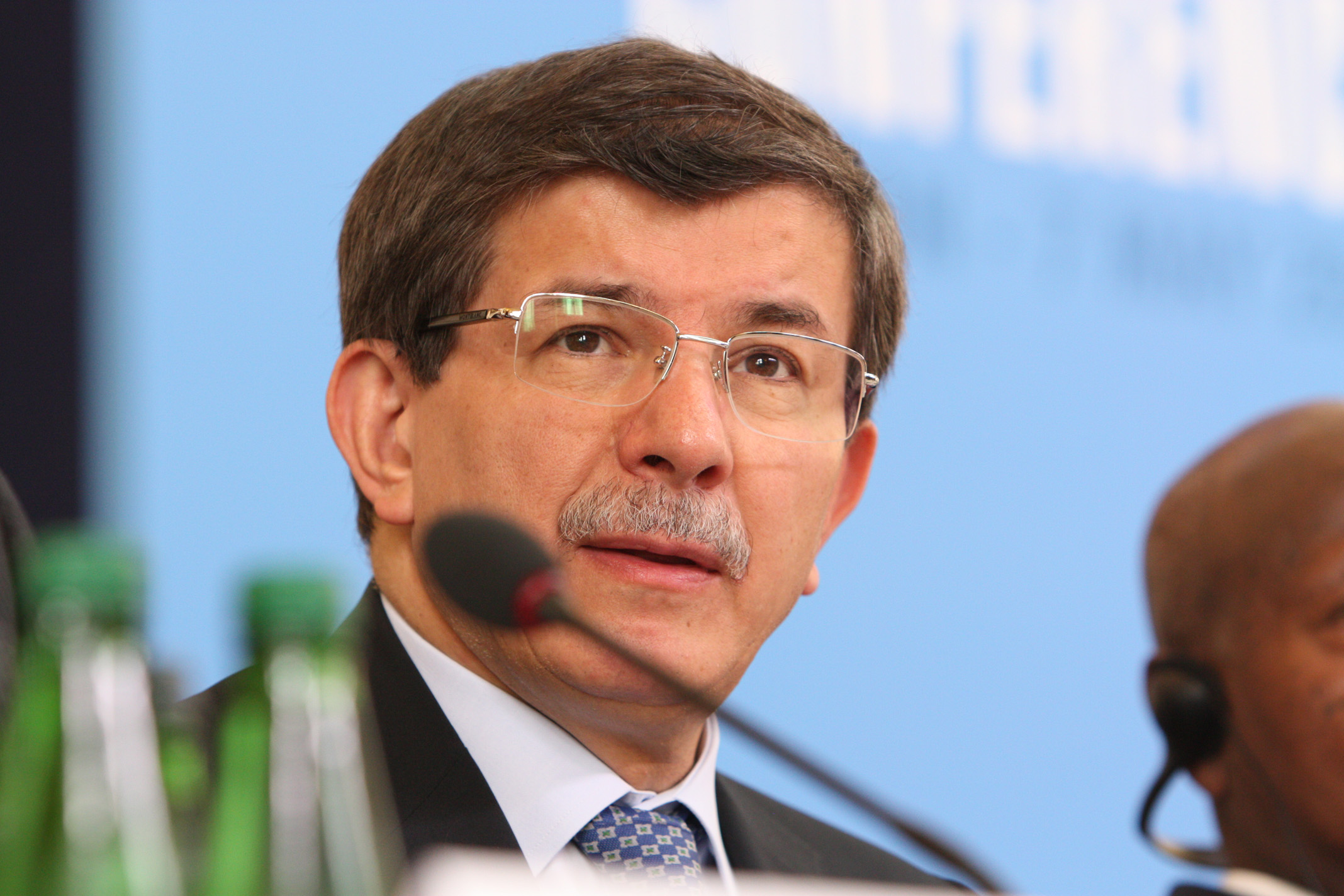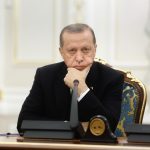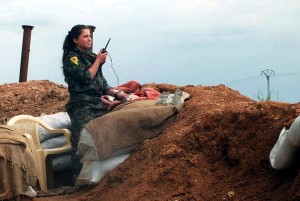by Robert Olson
In this article I want to discuss some of the dimensions of Prime Minister Ahmed Davutoglu’s speech at Mardin Artuklu University on Feb. 5, 2016 at a meeting titled “Fraternity Gatherings Mardin Conference.”
First I will try and organize Davutoglu’s remarks as they were published in newspapers in Turkey in Turkish and English. Davutoglu called his plan or, at least the plan of the Justice and Development Party (AKP), to address, if not to resolve, the most pressing issues between the state, the AKP, most of the political parties, the armed forces and the intelligence industry and the Kurdish nationalist resistance forces, the Kurdistan Workers’ Party (PKK), the Kurdistan Communities Union (KCK) and the Democratic Society Congress (DTK), among other parties and organizations.
Davutoglu’s “action plan” consists of several major points. He stated that his primary object was to “repair eastern and southeastern Turkey, which has been traumatized by months of ongoing conflict between security forces and militants of the outlawed PKK. Nobody should worry. No matter where it is — whether it is the Diyarbakir Bazaar, Mardin or Silopi — we will compensate the losses of all of our citizens due to terror. These [militants] have started a fire, but God willing we will grow a rose garden at the site of the fire.”
The first part of the 10-point plan stressed: “We will unite the nation’s conscience and wisdom with the state’s reason. All differences between the nation and the state will be entirely eliminated, and we will have an understanding of disruptive nationalism.” This seems to have emphasized that the disruptions were entirely due to the actions of the PKK/KCK. Davutoglu went on to say: “We are going to bind all the wounds. We who have welcomed 2.5 million Syrians are perfectly capable of offering all our help to our fellow citizens,” apparently referring to Kurds in southeast Turkey, especially in the vicinity of Diyarbakir.
Davutoglu vowed to strengthen the region’s economy through measures such as “postponing employers’ premiums debts and local tradesmen and farmers’ loan repayments.” He stated that this part of the action plan “would involve the government spending TL 26.5 billion [$9 billion] to revive eastern and southeastern Anatolia.” He admitted that the need for this amount was a result of the destruction, largely caused by the security forces, of the war started between the government and the PKK/KCK after the June 7 election.
The Message of “Compassion and Power”
The most important message of the prime minister was what he termed “compassion and power,” compassion for those Kurds who are not part of PKK/KCK terrorism, but “power,” i.e., armed force to be used against Kurds who oppose the state and its armed forces, gendarmerie and police.
Again, the prime minister stated: “Whoever tries to launch terrorist actions, they will be prevented and stopped, regardless of whether they exploit the feelings of our pious Sunni citizens as DAESH [the Islamic State in Iraq and the Levant (ISIL)] does, or exploit Alevi citizens as the DHKP-C [Revolutionary People’s Liberation Party-Front] does. The terrorists and the people will be differentiated, the people [Kurds] will be treated with compassion and the terrorists will be treated with power,” a euphemism meaning they would be killed.
Davutoglu indicated this would be done by “a communication system, consultation councils, a uniting spirit with the neighboring countries,” apparently referring to the Kurdistan Regional Government (KRG) and, or at least, the Massoud Barzani-led Kurdistan Democratic Party (KDP), as it seems doubtful that either of Turkey’s two most important neighbors — Iran or the Bashar al-Assad regime — will be very interested in cooperating with Turkey and its armed forces against the PKK, especially since both countries are stalwart supporters of the PKK/KCK, and of the Syrian Kurdish Democratic Union Party (PYD) and its armed affiliate the People’s Protection Units (YPG). While Iran is opposed to the PKK/KCK because of the PKK’s support for the PKK-affiliated Party of Free Life of Kurdistan (PJAK), it is not about to help Turkey in crushing the PKK in Turkey. It is extremely doubtful that Turkey is now in a position to receive any help from “neighboring” countries in its war with the PKK.
Davutoglu continued: “… a uniting spirit of public order, a comprehensive democratic reform process, social mobilization and recovery of space as part of a ‘masterful plan’ to bring stability to the Southeast. All governorates and district governorates will be tied into a communication unit, and information will be conveyed to our people [meaning the National Intelligence Organization/M?T] through the most effective communication strategies about what’s going on, at both the national and international level.”
But Davutoglu was not yet finished: “We are also launching a comprehensive movement to unite the spirit of this entire region in the Middle East, the Balkans and the Caucasus, for the beginning of a new era of fraternity — not only in Turkey.” The prime minister did not mention how Turkey would get Russia, the Assad regime or the Iraqi Shi’a government in Baghdad to cooperate in such an enterprise, let alone the countries of the Balkans.
Davuto?lu stressed the unity that Turks and Kurds had displayed at Kut al-Amara, saying, “We [Turks and Kurds] will be together in the coming period, God willing.”
The battle of Kut al-Amara on the Tigris River north of Baghdad took place from Dec. 7, 1915 to April 28, 1916 between British and Indian troops and Ottoman forces, largely Turkish and Kurdish. It was a savage battle and the British army was defeated. The battle was important as it also delayed British military operations in Egypt and Palestine for several months. The British ignobly surrendered on April 29, 1916, resulting in what one British historian has called “the most abject capitulation in Britain’s military history.” It was truly a victory of the Turkish and Kurdish Ottoman soldiers. The euphoria of the victory did not last long because by 1925, Turkey, now under the leadership of Mustafa Kemal Atatürk, was again in a full-scale war against Kurds as a result of the Sheikh Said rebellion, despite the fact that thousands of Kurds were fighting in the Turkish army. Davutoglu did not mention this part of the story.
Understanding What Davutoglu Was Referring To
Does the AKP leadership think that it will be able to achieve Davutoglu’s “action plan”? As I mentioned in a previous article, Zülfikar Dogan, in an article published in Al-Monitor on Feb. 9, 2016, fleshed out to whom and to what Davulo?lu was referring in his Mardin talk of Feb. 5. It is necessary to understand what Dogan was referring to in order to understand the full import of what comprises some of Davutoglu’s “action plan.” Here are the action plan’s interlocutors:
– A potential “Kurdish AKP” that could be created in the coming days to weaken the Peoples’ Democratic Party (HDP) and push its vote below the 10 percent threshold for parliamentary representation.
– The Free Cause Party [Hüda-Par], a Kurdish Islamist Party that withdrew from the Nov. 1 polls in favor of the AKP.
– The fledgling Kurdistan Democratic Party of Turkey — founded by Sertaç Bucak, the scion of an influential (Kurdish) tribe — which is politically close to the AKP and backed by Iraqi nationalist leader Massoud Barzani.
– The Kurdistan Socialist Party, which rejects armed action and is opposed to the PKK, is officially illegal and whose membership returned from a 35-year exile last year to re-engage in local politics.
– Dogan goes on to say that the AKP will depend largely on “two alliances — a feudal one with Kurdish tribes and their armed forces, the village guards, and a religious one resting on the Sunni Islamic axis — spiced up with a few token political figures who have no real popular base or influence.”
Indeed, Dogan thinks that the AKP may even be able to bring Abdullah Öcalan into the AKP “action plan” network.
Will this be enough to bring the PKK/KCK to heel? Will the HDP be able to persuade the commanders of the PKK in Kandil and now spread throughout Turkey, not just in the cities and towns of the heavily populated Kurdish Southeast, but in other cities in western Turkey, including Istanbul, Izmir, Mersin, Adana and Antalya, to mention just a few?
Are those Kurds loyal to the PKK/KCK still willing to fight the Turkish army, the national police and special teams of all sorts? Are the residents of Diyarbakir, Sur, Silopi, Cizre, Mardin and Urfa willing to put up with further destruction of their cities and the cost of reconstruction?
Davutoglu’s “action plan” alludes to an ever-tightening security, surveillance, communication and cyber war with the creation of an extensive informant system to surveil all dissidents or those determined to be informants and/or collaborators.
A more important question is to what degree the Kurdish bourgeoisie will cooperate with the state and the AKP in the rebuilding of the destroyed cities, especially Diyarbakir. It is well known in the studies of minority-majority relations that the bourgeoisie of the minority usually support the big bourgeoisie of the majority group.
This has also generally been true in Turkey. Indeed, many of the large Kurdish landowners generally cooperated with the Ottoman Turkish elite. This was also true after the creation of the Republic of Turkey in 1923. One of the reasons for this was that Kurdish landowners (derebeyler, agalar) sheiks and tribal heads cooperated with the state as I mentioned above in the case of Kut al-Amara. It had also prevailed before and certainly during the genocide of the Armenians in 1915. Much of the land owned by Armenians fell to Kurds as well as Turks. It was these lands that solidified the relationship between the Republican People’s Party (CHP) and Kurdish tribal leaders. This relationship has continued right up to this day — the Bucak tribe being a good example of this development.
Even more important in the case of minoritarian-majoritarian bourgeoisie or, if one wishes, moneyed classes, as the British historian Tom Nairn demonstrates: “Ethnic-linguistic features so prominent in the ideologies of nationalism have always been secondary to the material factors of uneven development.” Nairn argues that “the notoriously subjective or ‘irrational’ elements in nationalism are always functionally subordinate to an economic reality, provide one takes a wide enough development contest.” Nairn postulates that strong and pervasive nationalism, especially ethnic minority nationalisms, “have typically arisen in societies confronting a dilemma of uneven development — ‘backwardness’ or colonization — where conscious, middle class elites have sought massive popular mobilization to right the balance.”
Kurdish nationalists’ leadership from 1925 to present has not sought “massive” popular mobilization in order to increase the bargaining position with Ankara. This is evident in the fact that at least up until the present, some 75 or so AKP deputies are ethnically Kurdish, some of them holding minister portfolios.
In spite of the brutal and savage warfare between Turks and Kurds it is unclear whether the current war will increase in intensity and result in an even wider war and more destruction, perhaps even worse than what has been witnessed in the Southeast, Diyarbakir and in its historic center of Sur.
One of the important questions to be answered is what will happen to Sur? Will it be rebuilt (it is unlikely that it will be carefully restored) and if so, by whom? By a combination of Kurdish and Turkish developers from Istanbul and Ankara with plans to fill the Sur district with expensive villas, townhouses, boutique hotels and restaurants owned by the Kurdish and Turkish bourgeoisie in Istanbul and Ankara, so will the residents of Sur be expelled to the slums and poverty stricken gecekondus (shanty homes) surrounding Diyarbakir? Will Diyarbakir end up like Dubrovnik, full of villas and condominiums owned by multi-millionaires, while Kurdish workers are relegated to being waiters and bellhops? Is this one of the main objectives of Davuloglu’s “action plan”? It seems that it is.
Unlike Toledo in Spain, which is a Spanish city lovingly rebuilt after its destruction during the Spanish Civil War, Diyarbakir is in Turkey, to be sure, but it is and always has been a Kurdish city, and it should be rebuilt be Kurdish architects and Kurdish urban designers.
Indeed, there might be little time to rebuild Diyarbakir and the other destroyed cities of southeastern Turkey. Duran Kalkan, one of the principal leaders of the PKK, stated on Feb. 24 that a widening of the war is coming. He stated that “the month of March would be the beginning of a ‘Kurdish Spring’ in which the Kurdish youth would become even more radical.”
He also was critical of the KDP and of Massoud Barzani for his support of Turkey during the devastating assaults of the Turkish armed forces during the last seven months of 2015, continuing up until the time that this article was written, during which around 1,000 Kurds and Turks were killed and several thousand Kurds were compelled to flee their homes. Kalkan reminded the KDP leaders that the Kurds of Turkey, especially the PKK and KCK, experienced tremendous disappointment, disgust and fear when over 5,000 Kurds died in gas attacks on Halapja on March 16, 1988. Many more died in hundreds of other gas attacks. Kalkan pleaded, “Where are the Kurds of South Kurdistan [Bashur], shouldn’t they be fighting now with us?”
The hostility between the PKK and KRG/KDP became even more pronounced on Feb. 28 when Abit Ike, a member of the HDP, stated that the KRG “should be more mindful of the political and social situation of Kurdistan Turkey (Bakur)”. Ike suggested that the KRG stop the flow of oil and gas transportation and said, “We are aware of the financial situation in the Kurdistan region, but there is a war against Kurds in Bakur.” He did not need to draw the attention of the KRG leadership as on Feb. 16 the Kirkuk-Ceyhan crude oil pipeline was sabotaged triggering a long-lasting interruption in the oil flow and millions of dollars in damage. On top of that, the PKK claimed responsibility for the estimated $55 million in damage to the Kurdish region’s economy and the loss of 600,000 barrels of oil exports to the KRG. The PKK has also tried to persuade the KRG government from opening a natural gas pipeline to Turkey that would traverse regions of southeast Turkey.
It is obvious from these developments that the PKK/KCK is outraged that the KRG has remained quiet while the Turkish armed forces were in the process of waging full-scale war in the Southeast. These developments also indicate the increasing isolation of the KRG in the wider Kurdish nationalist movements in Turkey, Iran and especially in Syria. Kurds from Turkey and Iran are heavily involved in the fighting in Syria alongside the YPG, while there are fewer Kurds from the KRG. There is no doubt that the Kurdish question in Turkey is reaching one of the most critical points since the Sheikh Said rebellion in 1925. The big question is whether Prime Minister Davutoglu, President Recep Tayyip Erdogan and the AKP leadership’s “action plan” will be able to contain Kurdish nationalist forces. Will Kalkan’s promised “Kurdish Spring” be able to be successful when the Arab Springs could not sustain themselves?
Photo: Turkish Prime Minister Ahmet Davutoglu
Reprinted, with permission, from Today’s Zaman.





